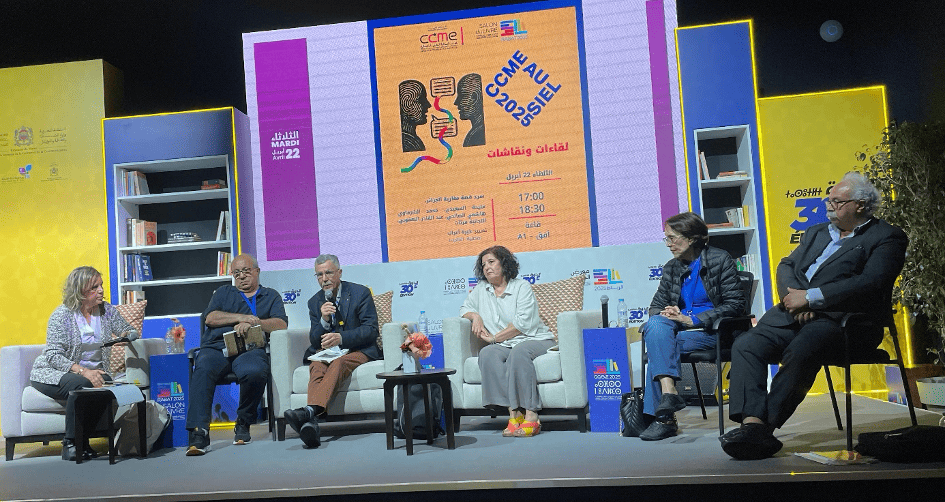
As part of the panels and discussions at SIEL 2025, the Ofoq Hall hosted a deeply moving roundtable entitled “Telling the Story of Moroccans in Algeria,” moderated by journalist Khira Arab. This powerful exchange brought together committed voices from Belgium, France, Morocco, and Algeria, united by a shared purpose: to shed light on a painful and often forgotten chapter of history - the expulsion of Moroccans from Algeria, particularly during the events of 1975.

As part of the panels and discussions at SIEL 2025, the Ofoq Hall hosted a deeply moving roundtable entitled “Telling the Story of Moroccans in Algeria,” moderated by journalist Khira Arab. This powerful exchange brought together committed voices from Belgium, France, Morocco, and Algeria, united by a shared purpose: to shed light on a painful and often forgotten chapter of history - the expulsion of Moroccans from Algeria, particularly during the events of 1975.

As part of the panels and discussions at SIEL 2025, the Ofoq Hall hosted a deeply moving roundtable entitled “Telling the Story of Moroccans in Algeria,” moderated by journalist Khira Arab. This powerful exchange brought together committed voices from Belgium, France, Morocco, and Algeria, united by a shared purpose: to shed light on a painful and often forgotten chapter of history - the expulsion of Moroccans from Algeria, particularly during the events of 1975.
Around the table, writers and witnesses shared personal and powerful testimonies marked by displacement, rupture, and trauma. These are the stories of Moroccan families who had built their lives in Algeria, many for generations, and who were suddenly uprooted and cast aside, not for turning their backs on Morocco, but despite their enduring love for it.
A novel was presented by Tijania Fertate, written by Mansour Kedidir, tracing the journey of Adil, a 17-year-old Moroccan boy abruptly forced into exile. Through this powerful narrative voice, the book embodies a struggle against historical erasure, giving life to experiences that had been left in the shadows for too long.
Abderrazzak Hanouchi emphasized the crucial role of audiovisual media and literature in recovering this silenced memory—the memory of Moroccan victims, survivors, and their descendants, whose pain has been passed down through generations and remains vivid today.
One testimony painted a deeply personal picture of this loss. The expulsion of Moroccan families from Algeria was described as a “detonation” by Fatiha Saidi, who was born in Oran and now lives in Belgium. She shared how this rupture tore through her family’s history, leaving her without a single photo from her childhood: “They stayed there,” she said. Her work with the CIMEA collective and her books, including Come Back and Tell Me You Love Me, form part of a larger, determined effort to keep this trauma alive in public memory.
A similar sentiment was echoed in the words of another participant, who revealed the long silence imposed by pain. Deeply marked by the 1975 expulsions, it took years for Mohammed Cherfaoui—also from Oran—to even speak the word “Algeria.” In his book The Black March, he writes with haunting clarity: “Fifty years later, the pain is still strong.” The trauma was further underscored by a harrowing account of a family’s forced departure on the sacred day of Eid al-Adha. Reflecting on this moment, Hicham Salhi captured the cruel symbolism with chilling simplicity: “That day, we were the sacrifice.”
Lastly, Abdelkader Elyacoubi presented his novel The Gardener of Arboras, which follows a man who leaves his homeland in secrecy, driven by an idealized vision of France rooted in childhood memories. His journey is one of disillusionment, longing, and discovery, mirroring the experiences of many Moroccans forced into exile.
This panel of voices served as a powerful reminder that those who were expelled never stopped loving their own country: Morocco. Their suffering is tied not only to the trauma of expulsion. In the end, the roundtable echoed one essential truth: to tell a story is to resist. And in the face of silence and historical amnesia, words become acts of remembrance, of dignity, and of healing.
